Boston is one of eight Massachusetts communities where the risk of getting West Nile virus is now considered high, health officials said Friday.
The other seven communities at high risk for the virus, which can cause severe illness, are in Plymouth County, according to the Massachusetts Department of Public Health: Abington, Brockton, East Bridgewater, Marion, Mattapoisett, Rochester and Whitman.
Large swaths of the rest of eastern Massachusetts are at moderate risk for West Nile virus transmission, according to the update, and other parts of the state are as well. Two people in Massachusetts have been diagnosed with West Nile virus so far this year, the first in Hamden County.

"The risk from [West Nile virus] is pretty widespread this year," State Epidemiologist Dr. Catherine M. Brown said in a statement. "In addition to recommending that people use mosquito repellent with an EPA-registered active ingredient and clothing to reduce exposed skin, check your window screens to be sure they don’t have holes and empty any containers that accumulate water around your yard."
Massachusetts is also tracking the spread of eastern equine encephalitis, another mosquito-borne illness, and last week reported the state's first human EEE case in years, a man in his 80s exposed in Worcester County.
Some Massachusetts communities in the area have been considering limiting outdoor activities at dusk, when mosquitoes are active, because of the risk of transmission.
Explore the map for both West Nile virus and EEE here.
West Nile virus usually causes fever and flu-like symptoms, but in rare cases can cause severe illness. There were six human cases in Massachusetts last year. EEE is rare, but poses a serious threat to infected people of all ages.



